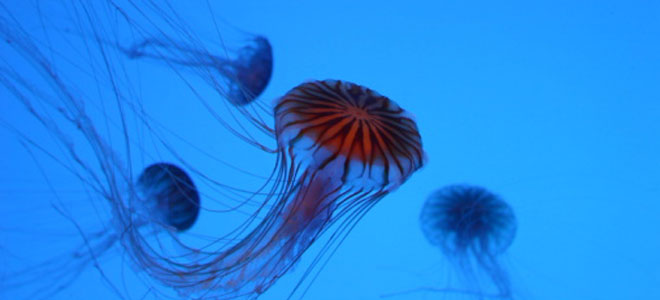In summer, jellyfish often invade our coasts. The scarcity of rain, the heat and the storms bring them closer to the shore without anyone being able to stop it. This is how in summer bathers can come into contact with the tentacles of these animals and suffer bites. Its tentacles have stinging cells that contain poison and are activated when they come into contact with some external element.

Symptoms of a bite
There are more than 4,000 varieties of jellyfish in the world and the stings of some of them can be fatal. However, in the Mediterranean, the most abundant species is the pelagia noctiluca, a jellyfish who’s sting only causes severe discomfort in the affected party, inflaming and burning the affected area, as well as causing pain. These symptoms may vary if we suffer from any type of allergy to the stinging cells of the jellyfish. Then the bite can get worse or complicated and symptoms similar to those produced by a burn may appear. Also, it is possible that the venom causes a sensation of chest tightness, muscle cramps and even respiratory distress.
Treatments and false myths
If you have been stung by a jellyfish, the first thing you should do is clean the affected area with seawater or, if we have it on hand, with physiological saline. If you do it with fresh water you will get the stinging cells to spread. It will also help us to apply ice covered with a towel or cloth on the bite for fifteen minutes. If we see any remains of the tentacle on the skin, we must remove it with tweezers and we can even use vinegar to help remove it, but we must never use our hands, because we would only be able to spread the bite to our fingers. Following these tips, the symptoms of the bite should not last more than three days.
If, despite following these instructions, we notice that the pain continues to be very intense and the bite worsens, we must quickly go to the nearest health center so that a doctor can prescribe an antihistamine or pain reliever.
Above all, given the persistence of a jellyfish sting, we must avoid rubbing the area with a towel or sand. Likewise, although popular wisdom states that urine is beneficial against jellyfish stings, the reality is that this is a false myth.
Prevention against jellyfish
Jellyfish do not sting for pleasure. Its tentacles attack only when they sense a threatening presence. So, when we know of the existence of jellyfish on the beach, we should avoid bathing in it at all costs. Jellyfish are sometimes difficult to detect with the naked eye and we can get close to one of them and scare it without realizing it.
It goes without saying that if we see any jellyfish, we should not touch it or try to catch it without proper protective gloves. The collection of jellyfish must be carried out by experts or people who are equipped for this task, so we only have to limit ourselves to notifying the lifeguard or emergency teams of the presence of jellyfish. They will already know how to act.
